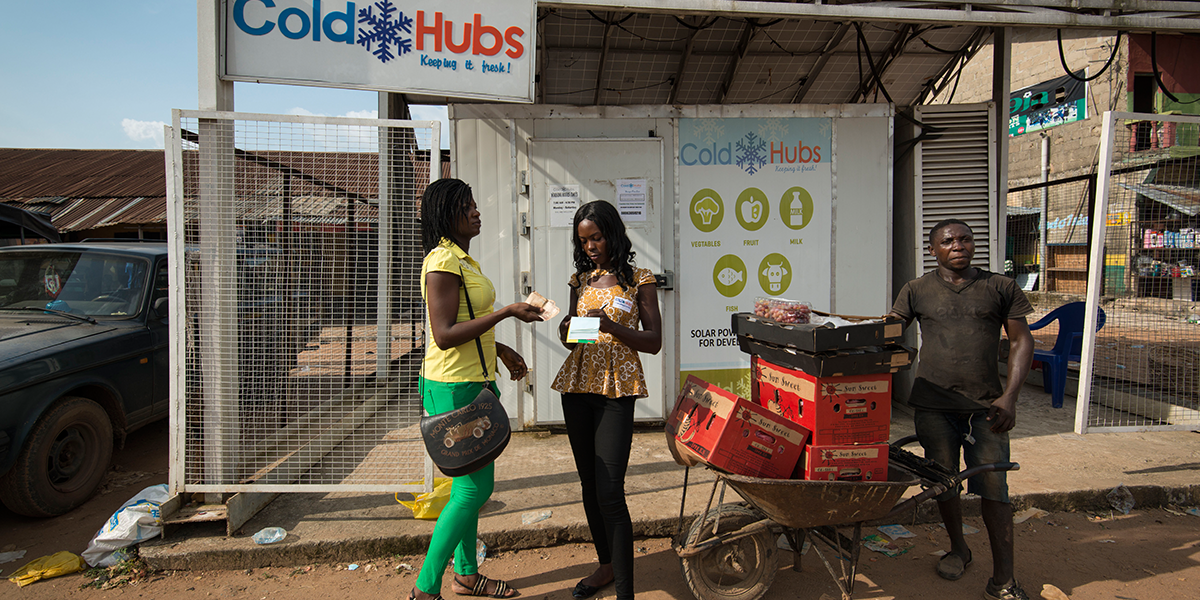English Translation....
Most African agricultural products rots on time before profits are made. The business idea of a farmer's son from Nigeria is to eliminate the problem permanently.
Tourists may already dream of cold beers on the Sahara crossing, while African market women are reluctant to keep their vegetables fresh for days. But for Nnaemeka Ikegwuonu, such prospects are far from being ambitious enough: the Nigerian has his eye on the 470 million small farmers from all over the world, who regularly have to throw away half of their harvest. If that were not the case, in Africa alone, according to the UN, 300 million additional people could be fed - hunger would be history. "This is one of the most in- novative ideas I have heard of recently," says American startup guru Michael Libes. "It could save and improve the lives of billions of people".
We're talking about "ColdHub" - solar-powered cold rooms that NnaemekaIkegwuonu wants to distribute to thousands around the world. The 35-year-old Nigerian agricultural expert has developed the almost ten square meter containers in recent years with the help of the Dresden Institute for Air and Refrigeration (ILK) and the Eschborn Society for International Cooperation (GIZ) - their decisive advantage is that they are independent of the electricity grid. Far more than half of all Africans still do not have a socket from which electricity comes from elsewhere: instead of waiting in vain for a connection, resourceful Africans are increasingly looking for decentralized solutions with solar energy.
At the age of 21, the farmer's son from Igbo Land had founded a chain of communal radio stations, through which small farmers could discuss their needs and their ideas for solutions. One of the most burning issues was the fact that the small farmers could not cool their vegetables and fruit, the radio presenter recalls: "In this way, they regularly lose a quarter of their earnings opportunity."
So the amateur journalist started his Internet research and came to the Dresden ILK, which already had a solar-powered refrigerated container. At 60,000 euros, however, the Mercedes among the aggregates for African conditions was far too expensive: the ILK's inventors were only able to sell three of them to the rocky Arabian peninsula. For Ikegwuonu, a much more frugal refrigerator version had to be found: a start was made when the Nigerian businessman found a local manufacturer of the isolator cell. Nevertheless, it would take another four years before Ikegwuonu finally found a partner with GIZ, which helped him to the first three cold hubs
Today, seven of the cooling stations are spread all over Nigeria: four more will follow by the end of May, and one will even be placed in a Tanzanian refugee camp. The business principle is the same for all ColdHubs: farmers or market women can store a fruit or vegetable crate for a day in the room-sized room, cooled down to five to twelve degrees Celsius, for the equivalent of US $ 50 is. In this way, the farm products, which in the African heat often linger after just one day, last up to three weeks.
Business idea a gold vein
Ikegwuonu expects that a ColdHub, which still costs $ 28,000, will pay for itself after three years at the latest: whether the cold rooms will actually be fully booked year round and will be as consistent as they are profitable prove, will have to turn out yet. "We will continue to support Mr Ikegwuonu," says GIZ in Eschborn.
That the business idea of
Nigerian's gold vein, doubts no doubt in Africa. While the continent is struggling with constant heat and electrolessness, sunshine is guaranteed: Solar-powered refrigeration units are a "match made in Heaven" for Africas.
Nnaemeka Ikegwuonu plans to launch 20,000 ColdHubs around the world soon: the Nigerian has never lacked ambition. "In 15 years, Cold-Hub will be a worldwide term like Sony or LG", the Nigerian inventor is convinced: Who will contradict him?
Translated from a German Frankfurter Rundschau- Panorama

